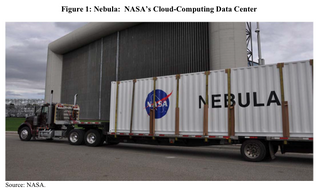Overview[]
Nebula was a cloud computing system developed at NASA's Ames Research Center in Mountain View, California in 2009. It was an infrastructure as a service implementation for scientific data and Web-based applications. Platform as a service capability was planned for the future. According to NASA, Nebula was to provide high-capacity computing, storage, and network connectivity using a virtualized, scalable approach to achieve cost and energy savings. Currently, NASA's Nebula is considered a private cloud and is operated at Ames Research Center on NASA equipment using both government and contractor personnel.
Nebula was housed in a standard shipping container that was mounted in place, but could be transported if needed (see Figure 1). Program officials chose this design as a means to easily replicate the Nebula equipment as the program expanded. The officials stated that a future goal was for Nebula to become a hybrid cloud as a way to eventually foster collaboration in analysis of NASA-sponsored research with the academic community and the public. As a result, Nebula relied on open-source cloud computing technologies so that data can be easily transferred to other cloud service providers, if required. The officials stated that when NASA data is first generated, its sensitivity must be evaluated to see if it is appropriate for public release. Once the decision has been made to share the data, the use of Nebula makes sharing information easier.
Officials also stated that Nebula could provide other benefits. For example, according to NASA, researchers who use Nebula will not have to purchase their own servers, hardware, and computing infrastructure, which can be time-consuming. Nebula is currently authorized to handle only low-impact data as defined in FIPS 199; however, officials noted that they may migrate to a moderate-impact system in the future.
Among other activities, Nebula hosted GSA's “USASpending.gov” websites.
In 2012, NASA shut down Nebula based on the results of a 5-month test that benchmarked Nebula's capabilities against those of Amazon and Microsoft. The test found that public clouds were more reliable and cost effective and offered much greater computing capacity and better IT support services than Nebula.
